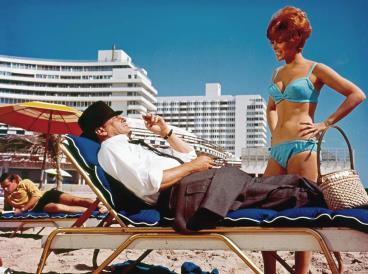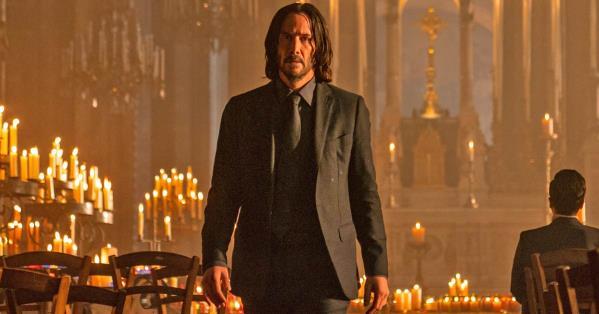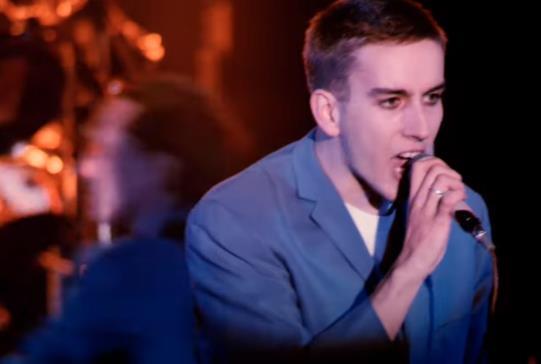
38 minute read
Concrete Jungle: Animals are After Me
"Where have all the good men gone", once asked Bonnie Tyler in her signature raspy voice. Cometh the hour, cometh the man. It is time for you to catch up on all things Bonehead Bill. This week we caught a limited re-release at the cinema with the return of Joe Massot's 1981 music documentary Dance Craze. First conceived when Massot met Madness on a US tour, which is why we have an American director taking on a British scene. We'll let him off though because he knows what it's all about. He had the idea to film a few of Madness's live performances but this soon developed in to following a few bands (namely The Specials, Bad Manners, The Bodysnatchers, The Selecter and The Beat) and trying to capture the mood of 2-Tone.
2-Tone was a popular genre that arrived between the late '70s and early '80s fusing together Jamaican music such as Ska, Rocksteady and Reggae with Punk and New Wave. Not sure who allowed this but it actually came out of Coventry. What else that place has to offer remains to be seen but maybe it doesn't even need to offer anything else because 2-Tone was that good. It's entire basis was to eradicate racism being perpetuated by Margaret Thatcher and her party of wrongens. We recently had the anniversary of the baroness's death (08/04), an occasion me and the boys celebrate by playing KC and the Sunshine Band's Give it Up at high volume, getting the beers in and screaming at the top of our lungs when the chorus hits, "Na, na, na, na, na, na, na, na, na, na Maggie's in the mud, in the mud, Maggie's in the mud!". It's a tradition that I want to see continue well after my death. She's met her demise man, she's a pile of ash, she's not coming back and every single day life goes on after that is a party. The world is a much better place that I am happy to be a part of.
Advertisement
Racial tension was what 2-Tone was reacting to. Hence the name referring to the different skin tones uniting. What better way to achieve that than combining Jamaican music with the biggest trend in the UK at the at the time, which was Punk and New Wave. Effective too because the hybrid too is somehow both highly political and also one of the most likeable, relaxed and beautiful things ever created. You could easily have called this genre 'good times'.
We're dealing with the sound of people coming together to celebrate culture and all things good about music in what it has the power to do. I'd be seriously worried about anyone who didn't like this form of music. It's too genuine and pleasurable communicating it's message not by shouting but producing something so cheerful that anyone can be won over what it has to offer. It is not just the conversation on the topic but one of those rare moments where we found a solution, even if only temporary.
Oddly, even the racists came on board with the music. It didn't completely cure their hate but they were certainly some of its greatest admirers. Almost as strange a phenomenon as it coming out of Coventry but here you had these white supremacists championing a genre with its roots so clearly in black culture. Such a paradox is pretty much unexplainable but it has happened before. Comparable to Eton students loving The Jam's Eton Rifles, stock brokers who idolise Patrick Bateman or right wingers who listen to Rage Against the Machine. Previously, I thought it was because these people didn't understand the meaning of these things or missed the satire but having experienced it from the other side I've come to believe that isn't true. Often, I have preferred art which calls out my own beliefs and mocks them. Sometimes, more so than art which endorses my beliefs. I think we warm to mocking when it's so on the nose and so comedically agreeable that you can't deny it of its truth. This goes further than the phrase any publicity is good publicity and to a point where you do have the self-awareness to say yes this is imperfect, as has been demonstrated but even after all this considered, this is who I am. Who I choose to be.
Romper Stomper and Green Room have both explored that blurring of lines and potential for danger at music concerts when you place so many radically different people together. In This is England, that is the central conflict of the film, depicting how the racists toppled the entire movement from within. Shane Meadows takes you back to the beginning of what being a skinhead was all about and how people like Combo damaged that legacy.
In one of the strangest and most jarring scenes, he shares an intimate scene with Milky, a black man in the gang. They talk about their joint love for music but then Combo's psychopathic nature is revealed and he ends up needlessly throwing out racial slurs and beating Milky to within an inch of his life. Meadows suggests that this racism is an inherent issue, generationally handed down and comes down to a poor relationship with the father.
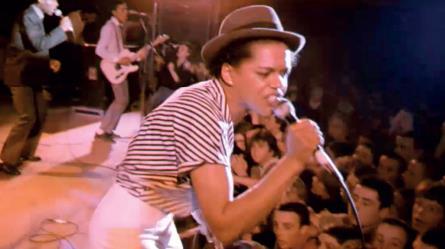
On a non-fictional level, there is also the Rolling Stones's documentary Gimme Shelter that observes first-hand the violence which can arise when people on different ends of the political spectrum meet at musical events. Stones hired numerous members of Hell's Angels to serve as the security and one of these guys would go on to stab a crowd member. Multiple times throughout Mick Jagger has to stop the music to ask crowd members to stop fighting, making for an extremely surreal event. Nothing kicks off during Massot's film but he also was very conscious of the potential for this problem and forced himself to go back through the footage and ensure there wasn't a single fascist salute or nazi imagery in the background. Any evidence of these things would have destroyed the entire aim of the picture and its utter feel good factor. Thankfully, the music marches on and becomes what I now believe is the greatest musical documentary ever captured on celluloid.
The musical documentary is something I have spent the last couple of years studying closely. They are an art in themselves. Of course, quality of music plays a factor but is far from the most essential element. For example, The Beatles two most famous gigs At Shea Stadium and The Rooftop Concert are far from the strongest musically speaking, they were after all a studio band, maybe even the studio band but these have massive cultural significance as a document. Firstly, Shea Stadium was the first concert with a crowd of that magnitude (Over 55,000) and proved rock could sell out these kinds of arenas. Changing the nature of the live performance. However, Shea Stadium sounded so poor with constant girls screaming and terrible technological equipment that it influenced The Beatles to give up touring and pretty much live in the studio going forwards. Only thing more historically important missing from the Shea Stadium gig is one of the most significant moments of the 20th century taking place just seconds afterwards.
We see these cars pick up The Beatles and take them away from the crowd and out the stadium. Where the camera really should have been is in the cars, where John Lennon was supposedly furious and ranting about the Beatlemania overshadowing the performance because their sound systems at the time were not good enough. Consequently, they made the big decision to stop touring there and then. They retired the suits seen in Ron Howard's Eight Days a Week, stopped being these tightly controlled media friendly puppets and entered their most creative spell. Whether you like The Beatles or not, any music fan should be grateful for how they were the first to pioneer a relationship with the studio and focus on the music at that level of innovation rather than the performance aspect. Whilst their live performances are a weaker aspect of their game, their musical documentaries historical significance is huge.
In a completely neutral sense, the work of Pennebaker, Robert Drew and Maysles and their contributions to 'Direct Cinema' are among the most influential. These creative independent filmmakers redefined the film set and stripped away its heaviest parts in favour of transportability and free movement. Essentially, the goal being too show up quickly and move around spaces with total ease. Therefore, hand-held cameras and synchronous sound becoming extremely popular. Firstly, it was synonymous with political documentaries following JFK around the White House in the early '60s. They didn't take along to set up, they could move around the building freely and if needs be jump over to another location for a talk quickly. All part of JFK's hip appeal to be part of this new art form and recognise its influence it could have on the masses.
Next, it would pop up in Don't Look Back, which turns its attention to Bob Dylan. This was the perfect style to embody him as an artist repeatedly evolving before your eyes. Constantly moving around, changing and challenging his critics. Using a tri-pod and stationary shot wouldn't capture these qualities that made Dylan brilliant. Scorsese would later be attracted to Dylan for two reasons. Firstly, to edit this into a typically ferocious montage. Secondly, on a more humorous note because he was drawn to the image of Dylan being a Judas figure after his abandonment of acoustic in favour of the electric guitar.
Don't Look Back mainly uses Direct Cinema for interviews, for the full live performance experience, one should check out Monterey Pop and Woodstock. These films perfectly demonstrated the marriage of film and music, allowing the music documentary to be a site where young talent from two different art forms could emerge. Before Martin Scorsese was famous he even worked on Woodstock as an additional director and editor but was sacked by Wadleigh for taking too long and trying to be too fancy in the studio. Scorsese's long time editor, Thelma Schoonmaker, also worked on the project as well as several other artists familiar as part of that eras New York arts scene. Musically, Monterey Pop was the first time the public saw many of these artists and if it wasn't for these they would be nowhere near as successful. For example, this was the gig that Jimi Hendrix was revealed to the world by playing as if possessed and then burning his guitar on stage.
So yes, the music documentary is about historical significance and technical innovation. It is also about the relationship between filmmaker and subject. Dylan's interviews linking to this. Recently, I saw In the Court of the Crimson King: King Crimson at 50, which as you may of guessed shines a light on King Crimson. A band I am unable to decide whether I like or not but this as I have discovered appears to be part of the overall experience that even their fans acknowledge. Bound to happen with so many line-up changes. They have a sound which is barely recognisable as the same band from album to album. Their 1969 debut In the Court of the Crimson King is viewed as their magnum opus but I'm not even sure whether I'd fully include myself as a fan. It opens with 21st Century Schizoid Man, something of a banger but bettered by Kanye West on Power. After this, the album deviates in to experimental jazz that for me does not compare to Miles Davis or Ornette Coleman. However, I do rate some of the detours in to a kind of proto-ambient territory that precedes frontman Fripp's later work that does intrigue me with Brian Eno.
I would have probably wrote off King Crimson if it wasn't for me being shown their '80s afrobeat inspired output, I'd have probably written them off. Discipline definitely arises from a lot of time spent with Talking Heads and Elephant Talk is a bit of a banger.
In more recent times, the near stoner metal sounding Red from 1974 has become my go to album for all things King Crimson. I credit Mandy for me giving this another chance and noticing the absolute perfection of a track like Starless. Got that on during a walk in the Peak District a few years back and the Bowie like epicness of it complemented the visuals I saw before me excellently. The weird part is I may fully go back to In the Court of the Crimson King one day and call that a masterpiece. It's not out the question. That's all part of listening to King Crimson. It puts me off and draws me to them in that I cannot work out whether they're good.
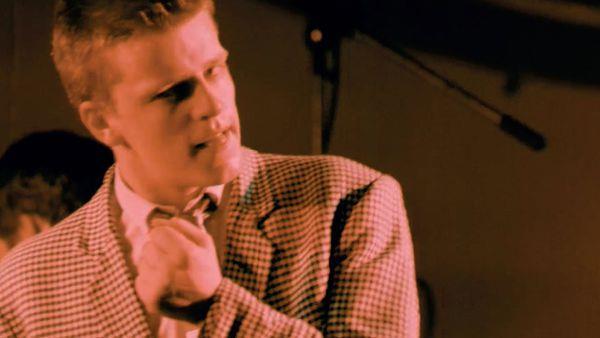
Crimson at 50 gets right in there with that conflict. Conflict in the act of listening to a sound so jarringly different album to album and the conflict between its band members. Unflinchingly, excommunicated band members share their frustrations at working with frontman Fripp. Those still in the band are extremely mindful of what they say, constantly glancing over their shoulder to see if their lord and master is watching. Even the director reveals he is fearful of being sacked at any moment. On this set, you're never too far away from receiving hair dryer treatment so heavy it hasn't been seen since the reign of Sir Alex Ferguson. Fripp's got them all on the strings. He's living rent free in the heads of band members going all the way back to 1969. What a cunt. What an artist. It's sort of like a real life This is Spinal Tap, you've never seen a gonzo experiment quite like it. Now that's a great relationship between filmmaker and subject that comes from the musical documentary. Although I'm yet to see it, I hear Werner Herzog's documentary on The Killer's is meant to express little love and absolutely no interest or admiration for the band, which sounds hilarious. The way a director positions the material is vital in this genre.
How far a music documentary catches a political movement or scene is often used as a measure of their success. Direct Cinema has its roots in politics and Woodstock is an exhausting look at the hippie movement. Exhausting being the perfect word with all its positives and negatives similar to a word like sprawling. Its breath-taking cinema but you also have to spend over 3 hours with a bunch of smelly hippies.
As discussed at the start, Dance Craze certainly nails the politics of 2-Tone. When it comes to this side of the music documentary, Godard's Sympathy for the Devil amuses me greatly. He basically exploited the star power of the Rolling Stones to go off on a tangent in to a rant on Maoism. Also, how is it Rolling Stones were repeatedly brought in to these political conflicts so accidentally? Were they like some Forrest Gump just wandering in to all these different arenas? Were they just so desperate to be part of something or were they just so big that they could be connected everything? Who knows what that's about.
Spectacle and showmanship is a necessity in the musical documentary. Depeche Mode, have always been concerned about their overall aesthetic and look. Their name literally translates to 'fashion dispatch' and are famous for having their own band photographer in Anton Corbijn. In terms of staging and outfits, Devotional Tour is an absolute classic. Pennebaker even worked with them on Depeche Mode 101, a conceptually strong piece placing a rare greater emphasis on fandom. The bus kids segments predate the rise in popularity of reality television. Industrial heads
Nine Inch Nails and Rammstein have been the best at tapping in to spectacle from a controversial standpoint. Nine Inch Nails initial introduction to the mainstream came as a result of them covering themselves from head to toe in mud for shock value. Rammstein spend more than anyone on pyrotechnics. Their Paris gig directed by Jonas Akerlund, who's projects vary from Lords of Chaos and Spun to Beyonce's Lemonade, features simulated sex acts such as walking around on stage with gimps attached to chains and performing mock fellatio.
Some will try to mention Beyonce in all this who is probably the most popular and overrated artist who supposedly experiments with the live performance. She has that modern fake beautiful and utterly shallow look that has become popular with music videos today. Where every shot is made to look pretty with no consideration of a shots meaning. A playlist or slideshow of random good looking images. There is only so far that beauty can go, especially when it doesn't latch on to where culture is going. Truthfully, I think she just watches Lion King too much.
For his comeback show in '68, Elvis gave us his greatest work. Its director Steve Binder does such a fantastic job it almost makes up for the cinematic crime of The Star Wars Holiday Special. If I recall correctly from my days in college studying theatre The '68 Comeback Special is shot in the round. Meaning crowds on all sides. Always a brave move because if you set-up in this way you have to act to all sides and be aware when your back is turned on some members of the audience. However, Elvis plays up to that at times giving a one man tour de force, just sitting bang in the middle in a full black leather outfit and doing his thing. He's sexy, he's cocky. That's a man made for the round.
In addition, Jonathan Demme's Stop Making Sense has some of that egotistical bullshit that really works as part of the appeal. For its opening number, another overcontrolling frontman David Byrne steps out on to the stage by himself with just an acoustic guitar and a boombox. He informs us he has a tape he wants to play and goes in to this really raw rendition of Psycho Killer that sounds indebted to early Hip Hop. Now the beauty of that show is that with each number more band members join them and the set design grows increasingly complex. From a rough backstage look to cinematically pleasing and more developed backdrops. There is also David Byrne's quirkiness emphasised through that fucking giant suit. A surreal and distorted sight gag of a big suit and small head.
I'm aware that the quality of the music and the performance of the band itself is important to a music documentaries success. However, I leave this to someone with a greater understanding of sound and music theory than myself to undertake in that direction. I would not be able to do the subject justice. So sadly, I'll have to leave out the brilliance of Bruce Springsteen's intimacy with his audiences for those with more capable hands. My main intention here has been to go over the film side that is separate and unbiased to the music.
With all this said, up until now Stop Making Sense has been my favourite music documentary. Purely for its imaginative approach to the concept of creation with the sets and the band building itself with each number. On top of that, the wordless beauty of the band all stood intimately under that lamp shade, swinging it from side to side and singing This Must be the Place. An act of lunacy. An act of life.
Consider yourself dethroned Stop Making Sense, there's a new king in town and it's called Dance Craze. I had the best time of my life watching this music documentary. The event is kicked off with a parody of 50s and 60s juvenile delinquent movies when it seemed as though the teenager was invented. So we get this older narrator, who's voice you may recognise (they brought the guy who did all those kinds of news reports to come back and do this), trying to understand the post-war generation and this emergence of a new market. Massot's message is that we've had those two decades and this is the new thing but once again it does come from the youth.
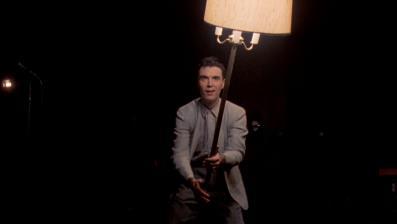
Half way through the film this narrator does come back to break up the live performances. They return to the invention of all the different dances. As you'd expect, when the twist rocked up, Mr J M Kelly got rather excited. Do I need to mention again that I am a twist man. I'll be doing the twist at my funeral like I'm Chubby Checker. Massot stated that the reason for the inclusion of this segment at the middle was because he believed the performances were so high energy that the audiences needed a break. He's not wrong. Honestly, it matches that level you've seen in Stop Making Sense. When asked why this music is infectiously energetic, the artists have pointed to craftmanship of the drummers.
The Specials are the first band to kick off this wonderful event. Terry Hall does his trademark lingering. Even when he's not singing he loiters in the frame an ever evil, untrustworthy and menacing presence. I believe it's in the eyes, has the detached look of that guy from Gaspar Noe's Enter the Void. They could be related those two. The Specials opening number is Nite Klub. Just about the best take on the emptiness of the club scene I've heard since Soft Cell's Bedsitter. Ever relatable, Hall asks, "is this the place to be? What am I doing here?". His comedic side revealed when he says, "I won't dance in a club like this, all the girls are slags and the beer tastes like piss". A line that produces a cackle of laughter from Bonehead Bill. He whispers into my ear after, "not often these days you hear a hard 'slags' just thrown in there for good measure".
The next frontman to leave an impression was Bad Manner's Buster Bloodvessel. A massively overweight bald fellow who jumps on stage and introduces their first number by saying, "the next song you might have heard before. It's called...", and then he takes a genius well timed pause before screaming "NeNe-Na-Na-Na-Na-Nu-Nu". Now, that’s what we praise at Funeralopolis. Pure silliness and utter gibberish. An inspired act of madness. One that recalls the best part of Woodstock when The Sha Na Na's jog on stage one by one in silly outfits and near conga formation and sing At the Hop. Later, Mr Bloodvessel makes his presence known again by doing this weird shit with his tongue to the beat. A rather disgusting action that he refused to stop doing and he is famous for. Everybody in attendance at the cinema was totally repulsed by the action and wanted it to stop. Bonehead Bill tried to recreate this tongue action but I told him any more of this and I would have to punch him in the face.
I have never seen musicians looking as though they're having as much fun as they do in Dance Craze. Just dudes wrestling on stage, cracking open cans, playing saxophones and throwing shapes. Formally, the shooting style mirrors that hangout free flowing nature too. A general rule of thumb (which I don't like) of music documentaries is that they are shot off the stage and from the perspective of the crowd from about row three. Similar to how boxing movies annoyingly (apart from Raging Bull) don't like to shoot inside the ring. In doing so they recreate some of the experience of what it would be like to be in that crowd but you lose a lot of cinematic potential by not changing viewpoints and thinking about the camera and home audience.
Dance Craze stands out from the crowd because it shoots everything on the stage with the band. Occasionally in a set that can happen once or twice. However, nobody has had the skill that the filmmakers here possess. They hold steadicams on their shoulders and move in time to the music, rocking back and forth to the beat. You are on stage with the band, taking it all in and dancing with them. That's where it's all happening. How anyone can hold those cameras and move to a beat at the same time is beyond my own comprehension. Shit, I can't even stay in time. It's insane.
Generally 16mm (blown up to 35mm) was seen as the standard for music documentaries. Until, you could probably guess this but Scorsese went and questioned why not cinematic 35mm? So he went away and made The Last Waltz. Dance Craze follows suit here and goes for 35mm, which can then be blown up to 70mm without any of the image quality being lost in the process. Long lenses are used such as 300mm and even 600mm. Joe Dunton who shot Dance Craze was a lens obsessed freak. Known for his work with Stanley Kubrick on Eyes Wide Shut. Given that Kubrick was one of cinemas most lens oriented filmmakers and all the technical details here, you end up with the most beautiful and cinematic gig ever conceived. A cover of Wooly Bully (used in Full Metal Jacket) even appears.
Both a film of technical innovation and cultural significance. Whatever it is you care about I'm sure you'll find it in Dance Craze. Get lost in Concrete Jungle's imagery of being chased by the national front and fearing knife attacks in the streets. Madness give a bizarre rendition of Swan Lake to appease the "classical music lovers". How kind of them. They save the biggest two hits for last with The Beat's Mirror in the Bathroom and Madness's One Step Beyond
Before I forget, there is a guy in the crowd stood in his The Beat t-shirt with the biggest Balthazar Marie energy you've ever seen. All in the teeth and elbow movements. Unsure as to whether they look alike or if it's all in the movements and the energy. But that's Balthazar Marie.
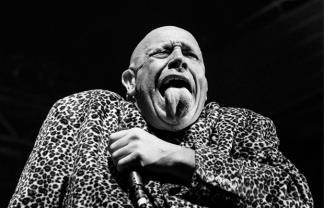
One Step Beyond comes on and I'm bopping side to side, caught in the groove, unable to keep still even if I wanted to. I look around for Bonehead Bill, who went the toilet around the time The Selector were doing Too Much Pressure
He was missing all the best parts! I look down and there's Bonehead Bill skanking in the space between the front row and cinema screen. I lock eyes with him and he comes up the aisles shuffling like a mad man. Finally, Nite Klub is performed again as a reprise and everyone in the films audience gets on the stage to sing it with them. Unphased by the numerous people on stage, Terry Hall continues to linger on the stage. What a way to go out.
Slipping out The Light Cinema, Bonehead informs me, "it's happening tonight, you know that thing we talked about up in the peaks. It's happening tonight" "No. No. No", I beg over and over trying to talk him out of it. I'd agreed to do something I shouldn’t have agreed to. Again. Purely on the basis, I didn't expect it to happen and was half joking when the agreement was made. You know the drill, right? About a couple of days ago, I'd made some off-hand remark about how Sheffield was the Dogging Capital of the World. Ever since, Bonehead hasn't stopped talking about this and wanting to know more. I told him there was a website and no I had not used it.
"How can we call ourselves residents of the City of Sex and Steel if we haven't gone dogging in the arse end of nowhere?", asks Bonehead. A legitimate question that there was no answer to. Caving in, I told him, "Fine, if you set this up and get us these women to dog, I'm in". "Don't worry about Bonehead, Bonehead will get the broads in", answered this disreputable fellow I call my friend. "Bonehead, I don't think you can say that anymore", I corrected him. He laughed knowingly, refusing to back down, retorted, "fuck the Concrete Jungle" and then spat on the ground.
Would you have expected him to come through on this? Never make promises with this guy cause sometimes he does the unthinkable and comes through like when you task John Wick with the impossible. He simply finds a way. One thing you need to know about Jacob Kelly is that when he says he will do something, he will do it (albeit with a little convincing). The convincing took place in a pub named The Scotsman's Pack. An old school cosy boozer in Hathersage. A place of ancient secrets about 10 miles outside of Sheffield. Climbers will know Stanage Edge which sits in the distance and my horror guys will know it from The Living Dead at Manchester Morgue. Mainly shot in the Lake District but uses St. Michael's Church down in Hathersage. The final resting place of Robin Hood's right hand man, Little John. Last time I'd been up in Hathersage, Ricardo Carvalho and I reported to Little John's grave at precisely 12:01 after pint 9 and poured a few cans out for the fallen brother. Promise me, if you ever find yourself up there you shall do the same. Got to honour the fallen brothers when you get the chance! Also, watch The Living Dead at Manchester Morgue because it's great.
It took me about 6 pints to work up to it. "Right, walk me through your plan and it better be good otherwise I walk. Actually not because it's pretty far but you know what I mean", I say, giving my partner The Bourne Ultimatum. "First of all, Kelly, I'm glad you're with me to share this special experience. Truthfully, I don't think anyone else would have come with me. So for that I thank you", shares Bonehead, locking his fingers as if ready to go in to delivering a PowerPoint presentation he's worked hours on. "Yes, I'm sleazy. And I love women. I get it. But can you get on with it. We haven't got all night", I demand. "Ok. So you may have noticed I stopped off at mine on the way here to pick up these", he adds slapping a humongous rucksack, a large elephant in the room that I was going to address soon if he didn't. "Well, in these are a tent and a couple of sleeping bags. Me and you are gonna hike up to the hills to some GPS coordinates that I have saved on my phone. When we reach our destination, there will hopefully be 2 broads waiting for us", Bonehead continues. I was amazed he knew what GPS was. How had he fixed this? Had this been too great a power to bestow to one man? What would Peter Parker say about this?
Unsure what to say, all I could do was nod and prey the unknown forces of the galaxy would pull both ourselves and two attractive women who wanted to have sex with us to the same spot at the same time. Was that too much to ask for? "Goes without saying that I get first pick, considering I set this whole operation up", Bonehead clarifies. This receives another nod from me. Them the rules. "That's if they're there. And that's a big if. But yes, if they're there, you get first pick", I agree. He shakes his head and says, "Kelly, you not been listening to me. When Bonehead says he's gonna get the broads in, he's gonna get the broads in, alright?". He was clearly full of confidence. Admittedly, I had little faith but it was a case of there was nothing better to do that evening. At worst, we'd just end up having a few beers with a scenic backdrop. Not the end of the world, is it?
"So, who are these...Mädchens anyway?", I query. "They wanted to remain anonymous. Been speaking with one of them the last couple of weeks trying to set this up though. They seem cool. Just a couple of mates looking to get laid without the hassle of relationships or intense grafting, ok?", Bonehead responds.
"What are they going to be like?", I question further. "As I said, like us, brother. Just a couple of bints. Wanting to get laid. It's not that complicated", Bonehead simplifies. "Surely, this has to be complicated. A couple of women want to meet up with us and fuck us. In the woods", I counter. Silence strikes between us. Bonehead straightens up, folds his arms and leans back shaking his head, as if to say, "Kelly, I expected better from you".
We journey in to the land of timber. Every tree stands to attention like a giant cock fucking the sky. Animals scurry all around us nibbling in to tiny pieces of captured prey. This is their playground. And we are only guests. We must be mindful at all times. Any respect shown must be returned tenfold. As we walk, my mind wonders to our female counterparts. What sort of disturbed degenerates would agree to meet some people they didn't know and fuck in the peaks 10 miles out of town? No way these Mädchens were mentally stable. "No way", I mumble to myself. Possibly I spoke these words aloud because Bonehead turns to me with a confused look on his face before darting forwards again to glide past the endless erections. Were we really getting laid tonight?
Bonehead stops for a second, before offering me a tab. Normally, I'd have said this was not a good idea given the infinite number of things that could go wrong from this. But we were a few drinks in and at this point I'd have probably said yes to just about anything. So I put that fucker on my tongue and let it settle. My stomach instantly regrets it and wreaks its revenge. It'll pass. It'll pass. It usually does. Ignoring the urge to scatter gallons of goo across the woods like a Sam Raimi movie, I proceed forwards. there was no turning back now.
After what felt like miles, Bonehead gives a sharp whistle and points over to two towering figures dressed in long black puffa coats that would have made even Arsene Wenger flinch. Damn these dames came prepared. It felt like 20 below out there. Not that I had any idea what 20 below was like. But respect where it was due. These were undeniably true survivalists, we couldn't take that away from them.
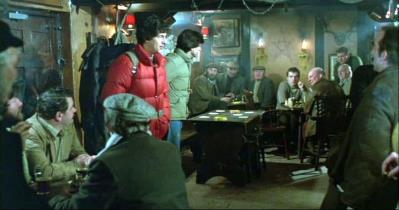
Could they fuck though? That was the real question. Who cares. If all goes wrong, we can just marry them. They're clearly very resourceful. You don't see that much of that breed around nowadays. So when it's there you have to snap it up and say, "Girl, you are my inamorata" and seal the deal with your finest silver.
Did the potential presence of women rob us of our senses? Our horniness leads us to our downfall. Those long black puffa coats put an extra spring in our step. We looked up when we should have looked down. Across two nearby trees was a thin rope and we both tripped right over it like fools. We tumble to the ground like Jack Grealish in the penalty box. As we lay on our backs, the bottom of those long black puffa coats fly across the night. A slow screeching sound fills our ears as the zips go down and the long black puffa coats fall to the ground. Our counterparts carry a baseball bat under each arm. So that's why the Arsene Wenger attire. Our eyes continue upwards until we reach their faces. We were looking straight at The Pseuds. This was their trap and we walked straight in to it impervious to the danger and blinded by our salacious appetites. "Fuck", I exclaimed, definitely aloud that time.
"You have got to be the most stupidest cunts I've ever seen", mocked one of The Pseuds. "You forgot horny", weighs in Bonehead. The other Pseud said, "shut it, Big Head". It was getting hard to tell who was who. Around this time the tab was kicking in and I could hear their voices but their faces became blurred. Instead of seeing the faces of The Pseuds, I was looking up at the faces of Keith Carradine and William Baldwin over their bodies. "Get up, both of you get up!", shouts Keith. "Alright, alright. The joints are stiff", I protest. Baldwin pushes his baseball bat in to my back to show he's not fucking around. I got the message. They march us out of there in to the barrens and walk us like dogs.
"You just wouldn't leave us alone. Now look where we are. I can read you like a book", states Keith as he looks in to my eyes. "You're thinking how far are they going to go with this? Is he really going to use that baseball bat or is it just for show? Truth is I'm gonna kill you. Think about it. Why would we bring you all the way out here. Who else knows you're out here? Not exactly something you televise dogging, is it? Plenty of spots for burial in the peaks", says Keith.
He feeds off my silence and hollers in to barrels of laughter that go on for an eternity. "Or maybe I'm just saying all this to fuck with you?", doubles up Keith. "Well you should have brought a fucking spade shouldn't you, shit stain", I provoke. Keith's turn to face the silence. I spare him the ceaseless laughter.
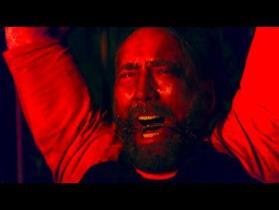
Our counterparts back to the edge of a cliff. Baldwin takes a look over the drop, then towards us and winks. "Alright Babe Ruth, you're up first", says Baldwin as he steps aside to give Keith some room. Keith takes the opportunity to limber up and make the build-up as dramatic as possible. Slow, painful mind games a la Emiliano Martinez. Bonehead whispers in my ear, "I'm sorry for what I'm about to do". Instinctively I say, "ok" and before I can fully register the comment and finish saying, "wait, what are you going to do?", Bonehead screams, "Me voy a casa!" And spears me off the cliff. He went right, I went left. Rolling down the hill like a couple of tumbleweeds caught in the wind. Flashback to childhood when we used to go sledging as kids up by Andy McClusky's house. When they called me the eskimodo cause of all the snow that would gather on my hunchback. Head hits a rock. End of memory. 8.15, that's the time it's always been.
When I awake, a couple of goons in suits and fedoras have me propped up and are directing me towards a car. "Come on Petey Snickett, boss wants to see ya", one of them tells me as though reciting some awful lines from Guy Ritchie's next gangster movie. "Jesus. You look just about ready to get in a Chicago overcoat. You gotta watch yourself, Petey. They say we got us a heatwave. It's not normally so hot out here. Hell, the Lake Michigan winds usually keep everything cool", mentions goon number two. I let out a, "what?". "The almighty Hawk", returns the first goon. "What?", I say again. "The Hawk not only socks it to you, he socks it through you like a giant razor blade blowing down the street". Before I can make any sense of this, I am dumped on to the back seat of a 1928 black Cadillac. Goon number one throws in a handkerchief for me to clear the sweat off my face. "Where we going?", I ask. "See the boss. He wants to talk to you. So get yourself cleaned up and looking sharp", revealed goon number two and stepped on the gas.
Shiny floors mean tapping toes. Three pairs all go tap tap tap in to "The Boss's office". Some Bob Hoskins looking motherfucker greets me and offer me a drink of my choice. I help myself to a Brown Derby from the mini bar to my right. "Ok Jacky, what's the score?", I ask the boss. He tucks in to a slice of chocolate cake and tells me he has a job for me. My new role will be to burn files all day and all night in the basement. He was very adamant that these files never see the light of day. In fact, he was so persuasive, I think I'll have to do it. And so for the next 6 months that's exactly what I did.
Back in Derbyshire in the year 2023, Bonehead Bill was reaching the peak of his trip as he ran around in circles looking for a way out and back to the Sandero. He'd occupied his time so far by building trenches, carving arrow heads and fighting off what he believed to be the local marine reserves but I'm sure was really just a pile of rocks. To deal with the cold winds, he had chopped up one of his sleeping bags and turned it in to a coat. He was trying to master living off the land in the meantime, for who knew when he might return to civilisation? However, he didn't have a clue what was food and what was death. He was not yet a man of the woods. But he hoped he one day would be.
In the distance, Bonehead hears a whimpering dog squealing. Far from threatening. It actually left Bonehead worried for the animal. My guys a real animal lover so this incident really disturbed him. He got in closer to check out the situation. A poor dog was being kicked by an angry farmer who had a rifle pointing at his head. Bonehead was in two minds whether to ignore this or step in and take on a moody shotgun wielding farmer. He couldn't let it go. Luckily, before he could prevent this execution, the farmer changed his mind and instead whipped the dog with the barrel as he cried out, "Get going! And don't ever come back here again you useless bastard". The farmer turns away and the dog runs off right to the heels of Bonehead Bill. Unsure what to do, he strokes the dog and shows it some much needed love. Then, he continues on with his journey to find the car. Unexpectedly, the dog refuses to leave his side. He wanted to say, "Go on now, I can't help you", but he didn't have it in him so they bandied together as man and dog. Dr Doolittle had a new friend.
When his feet started to ache and the rain came down, a dejected Bonehead began to think about shelter. He'd lost his tent during the fall but he still had the sleeping bags. As luck would have it, there was a random unattended hut in the distance filled with straw. He made himself and his new companion a straw bed. The dog came in close, as though it hadn't been shown any love in a long time and he continued to stroke man's best friend. It was now that he noticed all the dogs imperfections. There were cuts and scratches all over its body and it walked with a limp. It was a dog without a tail, having clearly been chopped off. How could they treat a creature this way?
Bonehead wiped a tear from his own eye and said over and over, "You're not useless"
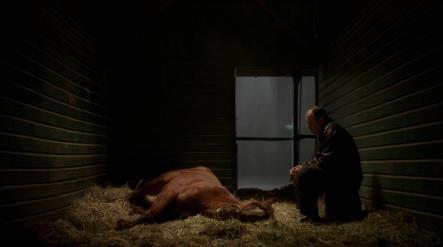
Holding him tight and looking at the rain slamming to the ground relentlessly outside, Bonehead began to sing, "Blue shadows on the trail. Little cowboy, close your eyes and dream. All of them doggies are in the corral. All of your work is done. Just close your eyes and dream little pal. Dream of someone. Blue shadows on the trail. Soft wind blowing through the trees above. All the other little cowboys back in the bunkhouse now, so close your eyes and dream". They both fell in to a peaceful sleep. Hours later, when he awoke the rain had stopped and the sun was shining down on his face but the dog was nowhere to be seen.
The basement was filled with stacks and stacks of papers. My sole job was to dump them on to a trolly and then in to fire. Looking around it would probably take centuries to take care of everything in this room. The pay wasn't all that good but my accommodation on floor three was part of the package. Of course, I couldn't help but read some of the documents to help pass the time. Many were dull accounting pages that would definitely land these guys behind bars. These didn't interest me. What did interest me was all the mountains of transcripts. Like Richard Nixon, the boss recorded all of his conversations. After 6 months of burning, I was nearly up to date on about 3 decades worth of mafia history. Eventually, I noticed a regular pattern across this span, which was a hidden snitch named Bartleby Wiggins.
I brought this to the attention of the boss. He was a little mad at first that I'd been reading the files down in the basement ("I pay you to burn the pages, not to turn the pages") but when he realised the damage Bartleby had done, he informed me this pigeon stool would be introduced to his "new Chicago typewriter". He tells me it types "very fast". Following the "sacking", I'm called in to the bosses office once more. This time he pours me a Brown Derby himself. "You know what you've done? What you've done for this family? I'm on to you. I should have seen through you straight away. You're not Petey Snickett. You were just pretending to be. No. I know who you really are. You're Mr Baker. Nice to meet you, Mr Baker", says the boss as he enthusiastically shakes my hand to the point of near yanking it off.
He promotes me by making me the caretaker of his sleaziest nightclub The Gangplank in St. Petersburg, Florida. This was to be completely run by myself as the boss was too busy losing money here in Chicago with all the steel strikes. He was sending out guys all over town to bust unions. All kinds of violent tactics were used but the numbers were too great. The boss had a lot of men but he didn't have 22,000.
Well, The Gangplank was the den of the underworld. A very risqué and swell joint. Placed strategically right by the dock so the booze would come right off the boat and in the back before anyone knew it was even there. I'll let you work out what two things the name of the place was a play on. Drinks were served in tea cups but nobody ever drank tea in The Gangplank. They built it directly over an Indian burial ground like an '80s horror movie. Their sprits dance at night to the music. A meal typically cost $2.50 but nobody really ate the food, they just drank whiskey and lots of it.
Some interesting characters would congregate there. People who would sit in booths all night listening to jazz records, drinking whiskey and talking about how much they hated Hoover. It was always, "Me and Falco were running a job down at The Grosvenor and then someone must have tipped the bulls off cause fucking Hoover's boys show up at the door before anyone but us knew what was going down" and "I fucking hate that Hoover"
I'll spare you the details but there were also many homophobic slurs directed at the law man and several references made to putting his protégé Clyde Tolson in certain physical positions on Hoover's office desk at the Department of Justice building. Occasionally, they would be distracted by a dancer on stage and pause their elaborate discussions on Hoover's sexuality.
Paige Harrison was the star of the show. Pulling out every dance move known to man soundtracked by Benny Goodman's Sing Sing Sing. She lived a very quiet life outside The Gangplank, respectably trying to raise her 12 year old child but every night during business hours she was the talk of the town. One night her dress strap ripped revealing nothing underneath and the place erupted. Took us about a year or two but soon we were pulling in quite a crowd. So I bumped up the price of the table for four package to $100 for special events. Good weeks, we were pulling in about 6 grand. We were making so much money, I started paying some guys $50 a day just to lay the terrazzo floors. But it didn't matter, Earl Gresh kept singing Row, Row, Rosie and the profits were row, row rolling in, which kept the boss back home happy. Safe to say, I adapted to life in sunny Florida pretty quickly.
After a while, I noticed The Gangplank wasn't really one club but two clubs. One floor was for the mob and the other was for the social elite. Both would glance across at each other's opposite number when their paths would cross in the halls with a look of envy as though they wanted what they weren't. The mob wanted respectability and the social elite wanted danger. So I fixed that right up when I got the crazy idea to do away with the two floors and unite them. Mobsters, politicians and the wealthy all sat together now sharing secrets and I got rich. If you could to begin with, there was now no chance of telling them apart. Everything operated on the same plane now. It wasn't an underworld on a separate reality, it was interwoven in to what the decent people called society. Truly organised crime. As long as that meant money, it didn't matter to the boss. If anything it made it easier for them to hide like this in the open and they had so much dirt on those crooked politicians that frequented the place. If the mob were going down, the politicians were coming straight with them like mould on a wall.
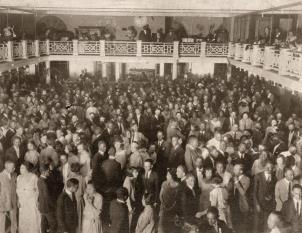
It was best for all that business continue as normal. The boss was so happy he called me in to his office again and poured me another Brown Derby. I was going to bed with a different dame every night of the week. Began affecting my work as it coincidentally grew sloppier by the day. It became harder and harder, especially when I was knocking in about 14 Brown Derbys a day. Normally starting from around 11 in the morning. Got so bad I had to start taking amphetamines just stay on my own two feet. Wasn't long before I got addicted to that stuff. My two floors I united into a whole became a single site of chaos that was near unmanageable. I kept a brass knuckle in my pocket. They called me The Iron Fist. Ruler of my kingdom.
This did not make the boss happy. He no longer served me Brown Derbys on arrival and I was let off with a few warnings. But these were ruthless times, what did they expect me to do? Many begin to ask questions about me. How was it a man with a most peculiar accent had gotten such a high profile gig such as this working under the boss? Who was this Mr Baker? I didn't even know who Mr Baker was but I continued to work under this alias and take his perks. I was becoming so popular I even warranted a visit from Hoover himself and his lap dog Melvin Purvis. They wanted me to turn snitch, I told them where to go. Hoover reminded me, "everybody gets pinched in the end". Had to be extra careful after that because his G Men had it in for me.
One night this girl comes in to the joint called Melanie. A Cuban immigrant who came over to escape Colonel Batista after the Sergeants Revolt in '33. She complains extensively about the economic situation in her country. All I can do is stare in to her emerald eyes. Right away, I knew that was my para sempre. We spent our nights at the club and our days on Clearwater beach listening to Chick Webb records. About 3 months later, we were married. We had the honeymoon over in The Bahamas. I promised to kick the amphetamine habit and sticking to my guns went about 2 years drug free. To celebrate one night we went to cinema. They had a movie on called Man Made Monster, about a crazy scientist who zaps a man full of electricity and makes him do jobs for him. It wasn't one of Universals best monster movies but it really struck with me. You replace electricity with Brown Derbys and you had my own predicament. Did I need to get out of this life? Maybe it was time to think about children.
On my way out the cinema, a one eyed dwarf is stood in the aisle. He asks me for some milk. I tell to ask his mother. Walking down the back alley, my thoughts turn back to the screen. The screen. There must always be the screen. It must always be filled. Otherwise we can only stare in to the void. The truth must be concealed. No technical hitches. No slips. Protect the presenter. The show must go on. Even in his lordship's absence.
My girl asks me what I thought of the film. I saw a film today, oh boy. I held her close and whispered in her ear, "the cinema was mediocre, now I just want to take ya back to the crib so I can stroke ya". All old Ernest Baker wanted to do is watch a decent movie then go back home with his girl. Everybody deserves that, right? Little did I know this woman had betrayed me. One final kiss to seal the deal. Before turning off the Baker's brain. Hoover beat it out of her. Not with his fists but with the threat of deportation. The usual dirty tricks from Hoover and Co. He may have been a bastard but he was right when he said they get you in the end. If it isn't him its flower nonce's agency. Your only choice is the cuffs or the coffin. A spray of bullets greets me. The warmest loudest reception I ever received. I went down slowly taking my final bow.
I could already see the news headlines. "The baker gets shut down. Why? Because he wasn't making enough dough". Hoover has the last laugh. Clipping his high heels together as his victory dance. I'd give anything to wipe that little smirk off his face just once. Covered in blood from head to toe, I raise up my head and ask, "So, is this where it is?". And Melvin Purvis points to me and says, "It's his". And I say, "What's mine?" And Hoover says, "Well, what is?". And I say, "Oh my God, am I here all alone?" "But something is happening here and you don't know what it is do you, Mr Baker?", says Hoover arms crossed and with a sick smile on his face. "I'll figure it out eventually", I add dryly. "And if you don't?", spits out Hoover.
